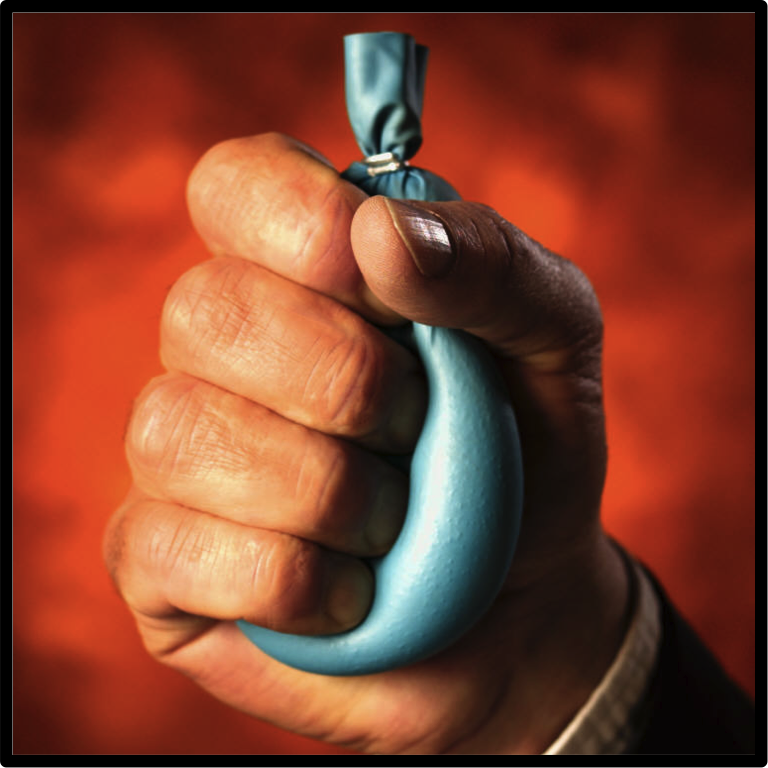 Well, it’s that time of year again. The business year is winding down. The holiday season is ramping up. And with just those two dynamics, the potential for stress is about to spike (if it’s not spiking already). God only knows what else could be contributing to the complexity, but – for me – it’s my wife’s continued battle with cancer.
Well, it’s that time of year again. The business year is winding down. The holiday season is ramping up. And with just those two dynamics, the potential for stress is about to spike (if it’s not spiking already). God only knows what else could be contributing to the complexity, but – for me – it’s my wife’s continued battle with cancer.
We are almost 5 months into this beast journey. Thankfully, she is in remission. But that doesn’t mean it is easy. Chemotherapy, bone marrow taps, hospital delays, unexpected side effects, and on and on. Add to that the countless internal conflicts of fear, fatigue, confusion, doubt, anger, and on and on. And that’s just what my kids and I are going through. My wife – well, I honestly can’t even begin to truly understand her perspective.
So, why am I bringing up this stuff? Because it is teaching me SO MUCH, and one of the biggest lessons has to do with understanding stress. How it works. How it distorts. How it causes great and horrible responses. How it causes great and wonderful breakthroughs.
Stress is powerful stuff.
We all get affected by it. We all experience victory with it. And we all experience utter failure with it. In our efforts. In our jobs. In our families. In our relationships. In our quiet moments. In fact, I would go so far as to say that our understanding of stress, and how it affects us, is genuinely one of the most important aspects of our lives. It’s one of the most important aspects of YOUR life.
Research consistently shows that stress is one of the greatest drivers for bad decision-making (I’m guessing that stupidity is reason number one). It causes our brains to retreat to survival mode – which often makes things worse, especially when you are tasked with leading a team or group of weirdoes like your family. (Note: For the record, you may be the chief weirdo. Just saying…)
Do you see the inherent conflict of being in survival mode while trying to lead others? It’s like saying that you want everyone to follow you/get along/be safe while you are shoving them off of your life raft.
Mirror moment: Do you do that? Shove people off your life raft, I mean. Do you allow your stress to justify your own fight for survival at the expense of others? Maybe your customers stress you out, so you take it out on your co-workers or direct reports. Maybe your work stresses you out, so you take it out on your family and/or friends. Maybe your family stresses you out, so you take it out on yourself (holiday binge eating, anyone?). Whatever. I know that I am not innocent here. What about you?
Rather than continuing to talk about what your stress looks like, today’s blog is focused on what causes your stress. Once you understand your own patterns, you can then begin to apply these concepts to other people. But do yourself a favor first. Build some credibility by working on yourself before you start pointing out the mistakes opportunities for growth in others.
It’s interesting to see what kinds of answers you get when you ask people, “What causes you stress?” Typical answers are: work, money, politics, a mother-in-law, etc. While partially true, they are not the right answers. If you will allow, I want to give three completely different answers. These answers, I believe, are at the root of most (if not all) stress. I find that every time the ugly part of stress raises it head, one (or more) of these dynamics is at play. In fact, you can review the stories of major, stress-related leadership and personal failures and find incredibly unhealthy doses of these things at play every time. Ready?
They are (drumroll, please):
- Success
- Significance
- Control
Please let me explain.
Each of these points is a desirable outcome. There is nothing wrong  with healthy success, significance, or control. The problem surfaces when unhealthy things become attached to these outcomes. Or in simpler terms, when we become addicted to these outcomes. I have seen wonderful, talented people become dangerous, ineffective people when their addiction to success/significance/control manifests itself. And the first indication of this addiction is stress. Let me explain what I mean.
with healthy success, significance, or control. The problem surfaces when unhealthy things become attached to these outcomes. Or in simpler terms, when we become addicted to these outcomes. I have seen wonderful, talented people become dangerous, ineffective people when their addiction to success/significance/control manifests itself. And the first indication of this addiction is stress. Let me explain what I mean.
Success, on its own, is a fantastic thing. It’s the ultimate measure of whether or not you are doing the right things. And yet, it is like fire. Small amounts are useful. Large amounts create havoc. Particularly when the definition of success becomes attached to your ego, your sense of identity. There is a massive difference between the idea of doing something successfully versus being successful. The first idea is rooted in accomplishment, one accomplishment at a time. The second is rooted in identity. And that is where the toxicity begins to churn, for once I make the leap from doing something well – one experience at a time – to measuring my own worth by the consistent presence of success in my life, I lose the original purpose of success. And I create stress every time I do not experience success. Or, as I more commonly see it, every time I see the tiniest hint of intended success beginning to stumble, I start to freak out. Because, in essence, my identity is beginning to stumble. And that causes stress. Often in massive, toxic amounts.
This idea is a touchy point. On one hand, we don’t want to create stress simply because we have an addiction to success (which is really what it is). On the other hand, we don’t want to be so lackadaisical about achieving success that it is never achieved. So, here is what I do when I have the self-awareness to actually practice what I am preaching – I ask myself a question. The question is this: “If I/we fail, will anyone get hurt?” This can be a tremendously difficult question to give an objective response to, so you may have to bring in other people to gain some perspective. But you have to learn to separate between failing at something that is genuinely going to hurt others (like a failure in the safety of a facility or event) from the impact of simply bruising your ego or reputation. Obviously, you don’t want to hurt others. But is your ego somehow paramount to the health and safety of others? Seriously?!
Look. We all have to recognize that failure is normal. It really is. No one is successful every single time. No one.
In fact, many of our greatest cultural icons for success (a la Joe Montana, Richard Branson, and so on) have far more failures under their belts than successes. Which is why they are known for creating success around them instead of contaminating everyone around them with stress. They understand that success is an outcome, but not an identity. Therefore, when success is at risk, they don’t stress. They thrive.
Which leads me to the second major cause of stress: significance. If you are someone who has to be at the center of attention, or even simply liked by everyone, you know what I am talking about here. You want to be recognized. You want the fame.
Listen, I get it. It’s fun to be in the limelight. It’s energizing. And if the reward for doing something that will make a major impact for other people is going to be some recognition, that’s an ideal prospect. I mean, who wants to do what is often difficult work without being recognized for it? Well, that creates stress. Some of you reading this right now are genuinely struggling because you are generating herculean amounts of effort to do important things – for little or no recognition. And you’re stressing about it. Growing bitter. Seething under your breath. Feeling under-appreciated. Whatever.
It’s all part of a grander scheme called insecurity. Somehow, whether by your own nature or how you were nurtured growing up (maybe even a combination of the two), you determined that doing significant things would produce some sort of recognition that you are a significant person. And if you aren’t being recognized for doing significant things, you stress out. Again, we are back to the idea of accomplishment versus identity. And we are back to the idea of addiction.
Being recognized is a wonderful thing – something that everyone should experience. But when that recognition reaches the point of being addictive, when the efforts you become part of (or the efforts that you make other people do) become the cornerstone of how you manage your reputation, any hint of insignificance sends you into a tailspin. You stress yourself and you stress others. You go to bed stressed and you wake up stressed. All because you need other people to recognize you as significant. My friend, that is no way to live.
If this describes you, try asking yourself this: “Is what I am doing exactly what I need to be doing?” In other words, are you doing the right things? Even if they are insignificant things? If the answer is yes, who cares if you are recognized for it? Trust me, the wheel is round. The opportunity for recognition will eventually come back around to you. That’s why we give lifetime achievement rewards and honorary titles. We eventually recognize people who consistently do the right thing. The right efforts will come back to honor you. Stop stressing about it and just do it. Don’t allow the stress of significance to derail you.
The third major cause of stress is control. Okay, let’s all  take a breath here. I say that because this is the one area where hyperventilation occurs most often. I mean, we all have to be in control to some degree, right? How can we possibly let go of control as an outcome? Well, to put it bluntly, control is a myth. And if you think that you have control over anything other than how you respond to reality (and I will argue how much you actually control your responses), you are living in la-la land. Say hi to the Oompa Loompas for me. And grab an extra dose of magic from the chocolate river.
take a breath here. I say that because this is the one area where hyperventilation occurs most often. I mean, we all have to be in control to some degree, right? How can we possibly let go of control as an outcome? Well, to put it bluntly, control is a myth. And if you think that you have control over anything other than how you respond to reality (and I will argue how much you actually control your responses), you are living in la-la land. Say hi to the Oompa Loompas for me. And grab an extra dose of magic from the chocolate river.
And this is where I see stress most often in the smallest things. The desire to be in control drives massive amounts of our behaviors. Even our daily routines are shaped by the tiniest efforts to be in control. We choose when to travel so that we can avoid the worst of traffic or weather, bringing as much control as possible to the commute. We choose to eat certain foods so that we can avoid the negative impacts that come from eating the wrong things, bringing as much control as possible to our health. Except, then, there is that one donut muffin kolache cookie forbidden bite of temptation that destroys all attempts at self-control. And we begin to stress.
We stress at every single disruption to our sense of control. That’s why traffic, politics, and mother-in-laws get such bad raps. They are not the actual enemy (well, mother-in-laws can be, but that’s not the point). The enemy is our sense of control. Traffic happens. Weather happens. Relationships happen. And if you are somehow trying to be in control of every little aspect of Life, you will only live in constant stress.
And this is where it gets… sensitive. Because I know that some control freaks are actually behaving this way because bad things happened to them when they were younger. Control – to them – is a form of therapy. Maybe this is describing you. Maybe you have created – no – justified your addiction to control because it is how you survive your past. Maybe, just maybe, it’s time to look differently at your attempts to be in control. Maybe it’s time to ask yourself, “If I don’t have control over anything, what is the healthiest thing that I can do?” The first part of the question is 100% rhetorical because you clearly don’t have control over anything. But I find that I have to remind myself of this truth before I can ask the real question – what is the healthiest thing that I can do? Note that the word healthy is the critical point here. I can readily choose the unhealthy things, but that only creates more stress. It’s the healthy options that move the stress needle back to where it needs to be. Sometimes, the healthiest response is to approach the disruption differently. Sometimes, the healthiest choice is to separate from the problem for a while (go for a walk, do something differently, take a break, etc.). Sometimes, it’s to get as far away as possible from the disruption. But the health of your response is not determined by whether or not it re-creates your sense of control. If you are trying to regain control, you are simply feeding your own inner beast. That is making your problem worse. Rather, let your response be one that supports the idea that you are not in control and you simply want to do the right/healthy thing. This is the right way to deal with your stress.
Now, obviously, we often deal with more than one of the success/significance/control dynamics at any given time. For example, we seek control so that we can be successful. We seek success so that we can be significant. God forbid we actually try to chase all three down at one time. I’m sure you know those types of people. You may have worked or served under someone like that. But the real question is this: are YOU like that?
Are you someone who is addicted to success/significance/control? Is the cause of your stress your attempt to be successful, be significant, or be in control? And, if you are a leader, are you generating stress with your attempts to be successful, be significant, or be in control?
If you want to reduce the stress in your life, try asking yourself these questions:
- If I/we fail, will anyone get hurt? If the answer is no, accept that failure is an option and that you may have to try again. And that’s okay.
- Is what I am doing exactly what I need to be doing? If the answer is yes, just keep on going and don’t worry about the recognition. It’s okay if you are not getting recognized. You are still making a ding in the universe.
- If I don’t have control over anything, what is the healthiest thing that I can do? If the answer is obvious, just go do that. If the answer is harder to find, ask for help in figuring out what to do. Asking for help will not be a sign that you aren’t in control, because you were never in control to begin with.
And as a bonus, remember this: the size of your addiction to success/significance/control determines the size of your stress.
I mua. Onward and upward.
By Tim Ohai


Well done Tim. I find myself using an old “trick” more and more these days as I am acutely aware of my stress “addictions” and that is to “Cancel and Replace” but i seem to still be failing misserably. This article was tough to read because of the truth in my that it speaks to. I need to pivot and work to answer the three questions you havce possed and get on with doing the right things one at a time. I can tell that I am attempting to plow too much snow at once (maybe).
My collective professional life does not feel or seem to add up to my definition of success. Because of this “missed target” I dont feel in control as i slip into some survival behaviors that are not what I should be doing…So I attempt to Cancel those behaviors and replace them with what I think I should be doing which then breeds anger. My anger at myself seems to be the fuel for this distructive evolution.
Payers for your family this Holiday Season.
Tom Naramore
Tom, thank you for the incredibly transparent response. I feel ya, brother. Stay tuned for the healthy alternative to being stressed in my next couple of blogs…
In the mean time, if you can just pinpoint the true problem when you are getting stressed (as it is happening), you have already won half the battle.